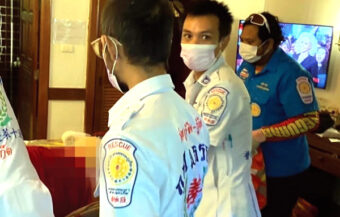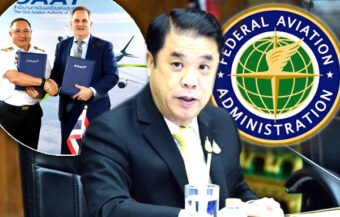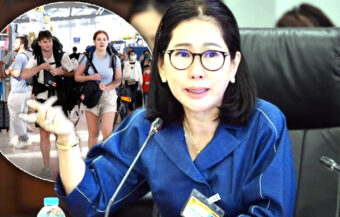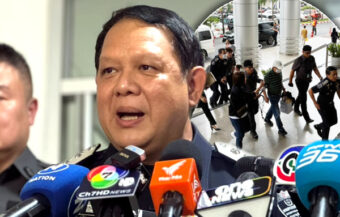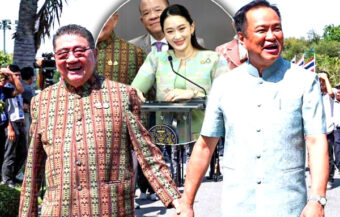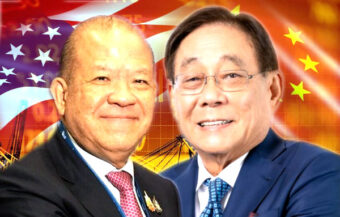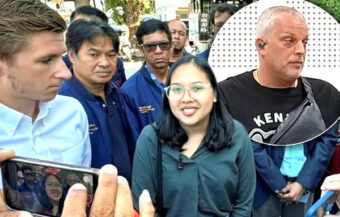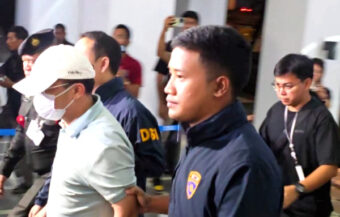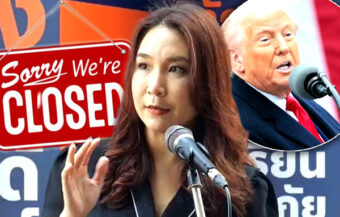Thaksin Shinawatra’s return to the campaign trail in Udon Thani is a strategic move to rebuild the fractured Red Shirt base, attack Thailand’s “shitty laws” and block a Bhumjaithai-led government. His bold stance is aimed at strengthening Pheu Thai for the 2027 elections.
The return of Thaksin Shinawatra to the campaign trail in Udon Thani this week is a strategic move against conservative forces in Thai politics. In short, it is aimed at creating a future political movement driven by the Pheu Thai Party and the People’s Party. At the same time, it is aimed at blocking a plan to install a Bhumjaithai Party-led government. These are the conclusions of political analyst Asst. Prof. Dr. Olar Tinbangtiew of Burapha University in Chonburi. Certainly, the former Prime Minister’s attacks on present political oversight under the 2017 Constitution as “shitty laws” make it clear ultimately what political mission he is pursuing.
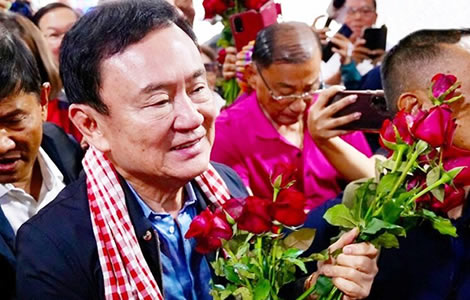
It has been a strong week for the Pheu Thai Party and Prime Minister Paetongtarn Shinawatra. While Thailand’s youngest Prime Minister was in Lima, Peru, networking with global leaders and seeking trade deals, her father, Thaksin Shinawatra, reignited his political presence in Thailand.
His charismatic speeches in Udon Thani have reinvigorated the Red Shirt base, a core pillar of the Pheu Thai Party’s electoral strength.
Thaksin’s open campaign speech marked his first public rally in 17 years. His presence and remarks captivated supporters, emphasising the need to address systemic flaws in Thai politics.
Thaksin critiques Thailand’s political laws as “shitty laws” stifling growth and incoming, fresh political talent
He referred to the country’s restrictive political laws under the 2017 Constitution as “shitty laws,” which he argued stifle leadership and invite sabotage.
He declared that these laws have put politicians in a straightjacket, thus stifling growth, receiving enthusiastic applause. His critique resonated with many, symbolising his resolve to challenge existing norms and attract fresh political talent into politics.
Udon Thani, a historical stronghold of Red Shirt supporters, was a calculated venue for Thaksin’s political re-entry.
Over the years, the once-united Red Shirt movement, the backbone of the Pheu Thai Party, has fractured.
Disillusionment grew, particularly after the party’s controversial coalition with former adversaries, including allies of General Prayut Chan-o-cha.
Many Red Shirts abandoned their allegiance, with some even burning portraits of Thaksin and his daughter.
The fragmentation extended to Red Shirt leaders. Jatuporn Prompan, former Chairman of the United Front for Democracy Against Dictatorship (UDD), became a fierce critic of Thaksin. He has since aligned with political opponents, threatening protests against Paetongtarn’s government.
Thaksin focuses on rebuilding the fractured Red Shirt movement to strengthen the Pheu Thai Party politically
Meanwhile, Nattawut Saikua, once a fiery voice of the Red Shirts, returned as an advisor to the government. Ajarn Thida Thavornseth, another prominent figure, continues to warn of an electoral reckoning from disappointed rural voters.
Thaksin’s return directly targeted this fractured base. His speeches in Udon Thani sought to rebuild trust, emphasising loyalty to the Red Shirt legacy.
Asst. Prof. Dr. Olar Tinbangtiew of Burapha University described this as a critical move. “Thaksin knows the Red Shirt base is vital for the political battles ahead,” Dr. Olar stated. “Reuniting them is not just symbolic; it’s strategic for both immediate and long-term goals.”
Dr. Olar noted that Thaksin’s rhetoric evoked excitement that had been absent in recent years. “For a long time, no one could inspire the Red Shirts like Thaksin,” he said. “This time, his presence and confidence created a new wave of enthusiasm. From Udon Thani, the whole country could turn red again.”
Thaksin hints at potential collaboration with People’s Party to unite progressive factions and counter rivals
Thaksin’s speeches also extended an olive branch to the People’s Party, the successor to the dissolved Move Forward Party. Despite the People’s Party’s status as Thailand’s most popular political faction, it has struggled to win elections in the north.
Thaksin hinted at potential collaboration, calling for unity among progressive factions.
However, his critique of the People’s Party’s policies also sparked debate. Dr. Olar interpreted this as a tactical manoeuvre.
“Attacking the People’s Party stimulates their support while ensuring Pheu Thai remains relevant,” he explained. “Thaksin understands that maintaining both parties’ momentum is necessary to counter the Bhumjaithai Party.”
Bhumjaithai poses a growing political challenge to Pheu Thai as Thaksin aims to prevent their rise to power
Bhumjaithai, a rising force in Thai politics, poses a significant challenge to Pheu Thai. With control of the Senate and a growing electoral base, it has become a rival for power.
“Bhumjaithai must be blocked,” Dr. Olar asserted. “If Pheu Thai falters or dissolves, its MPs could defect to Bhumjaithai, allowing it to form a government. Thaksin’s strategy is to align with the People’s Party to prevent this scenario.”
Another focus of Thaksin’s campaign was bolstering confidence in his daughter, Prime Minister Paetongtarn Shinawatra.
At 38 years old, Paetongtarn has faced scrutiny over her relative inexperience. Thaksin sought to address these concerns by emphasising his past successes and framing himself as a guiding figure for her administration.
“This is Thaksin using his legacy to build confidence in Paetongtarn,” Dr. Olar observed. “He is positioning himself as both a mentor and a guarantor of stability.”
Paetongtarn’s rising approval ratings signal growing public support as Thaksin strengthens her leadership
Recent polls suggest that this approach is working. A National Institute of Development Administration (NIDA) survey showed Paetongtarn leading as the public’s top choice for Prime Minister. The PM came out on top with 31.35% support. Consumer confidence also rose for the first time in months, signalling growing approval of her government’s direction.
The significance of Udon Thani extends beyond its symbolism. In the 2023 General Election, Pheu Thai’s dominance in the province was challenged. Both the Thai Sang Thai (2) and the People’s Party (1) won seats. Pheu Thai Party returned with 7 MPs. Reclaiming this territory is crucial for the party’s survival and future elections.
Dr. Olar emphasised the high stakes. “Udon Thani is a microcosm of Pheu Thai’s challenges,” he said. “Thaksin is using this campaign to stabilise the base and prepare for the next General Election in 2027.”
Constitutional Court’s looming decision adds urgency to Thaksin’s campaign and Pheu Thai Party’s survival
The November 22 decision by the Constitutional Court adds urgency to these efforts. The court’s potential ruling on cases against Thaksin and Pheu Thai are momentous. In short, it could destabilise the kingdom and jeopardise its economic future if the Pheu Thai Party is dissolved.
Dr. Olar believes Thaksin’s campaign is partly aimed at mitigating these risks. “By rallying public support, Thaksin is sending a message that Pheu Thai cannot be easily dissolved without political consequences,” he explained.
Thailand’s current political environment is increasingly defined by a triangular dynamic between Pheu Thai, the People’s Party and Bhumjaithai.
Dr. Olar sees this as both an opportunity and a challenge. “This triangular structure creates a delicate balance,” he said. “For Pheu Thai, aligning with the People’s Party while countering Bhumjaithai is critical.”
Thaksin’s broader political agenda includes constitutional reform and the potential return of his sister Yingluck Shinawatra
Thaksin’s campaign also touched on broader ambitions, including constitutional reform. Dr. Olar speculated that Thaksin’s long-term goals might include facilitating the return of his sister, former Prime Minister Yingluck Shinawatra.
At the same time, he is advancing economic initiatives like the development of southern Thailand and border trade agreements. In addition, there is a new casino law and plans to develop maritime resources.
This is the basis for the MOU44 controversy or the 2001 Memorandum of Understanding (MOU) with Cambodia.
“These are foundational steps for Thaksin’s vision of long-term leadership,” he noted.
The political stakes are compounded by ongoing legal threats. The Palang Pracharath Party, led by General Prawit Wongsuwan, continues to mount attacks against Pheu Thai. Despite polling at just 2.05% in the latest NIDA survey, the Palang Pracharath supremo remains a formidable force.
Thaksin’s critique of Thailand’s political system reflects his frustration with these challenges. His reference to “shitty laws” highlighted the obstacles facing politicians and the impact of these restrictions on governance.
Thaksin’s “shitty laws” critique resonates widely, showing his determination to challenge the status quo
The comment resonated widely, symbolising his determination to reform the system.
Dr. Olar described Thaksin’s remarks as a rallying cry. “These words cut through the political noise,” he said. “They encapsulate the frustrations of many Thais and reinforce Thaksin’s role as a leader who challenges the status quo.”
Pressure mounts again on PM Paetongtarn as the Constitutional Court seeks AG’s input on complaint
Prime Minister Paetongtarn is the people’s favourite for the top job according to latest NIDA poll
Thaksin warns drug dealers: “I’m back” as he tells Udon Thani crowd his children give him orders
Thaksin’s re-entry into Thai politics through Udon Thani is a masterclass in strategy. By addressing the fractures within the Red Shirt movement, balancing alliances with rivals, and confronting systemic issues, he has reinvigorated the Pheu Thai Party at a critical juncture.
Join the Thai News forum, follow Thai Examiner on Facebook here
Receive all our stories as they come out on Telegram here
Follow Thai Examiner here
Further reading:
Thaksin warns drug dealers: “I’m back” as he tells Udon Thani crowd his children give him orders
PM tests biometric sites at Suvarnabhumi Airport as she flies out to drum up business for Thailand
Thaksin, Pheu Thai six-pronged complaint being reviewed by the Office of the Attorney-General (OAG)
Ko Kood at the centre of Thailand’s rising political storm waged against Paetongtarn’s government
Pressure mounts again on PM Paetongtarn as the Constitutional Court seeks AG’s input on complaint
Ung Ing papers over the cracks of a cabinet which is already divided after only six weeks in office
Firebrand Jatuporn launches crusade against Thaksin Shinawatra and present government in Bangkok
Political storm brewing as the country’s leading parties struggle to reform the 2017 Constitution
Prime Minister Paetongtarn is the people’s favourite for the top job according to latest NIDA poll
Government is already divided as the PM shelves efforts at amending the 2017 Constitution on ethics
People’s Party on campaign but on guard against potential legal complaints to oversight agencies

